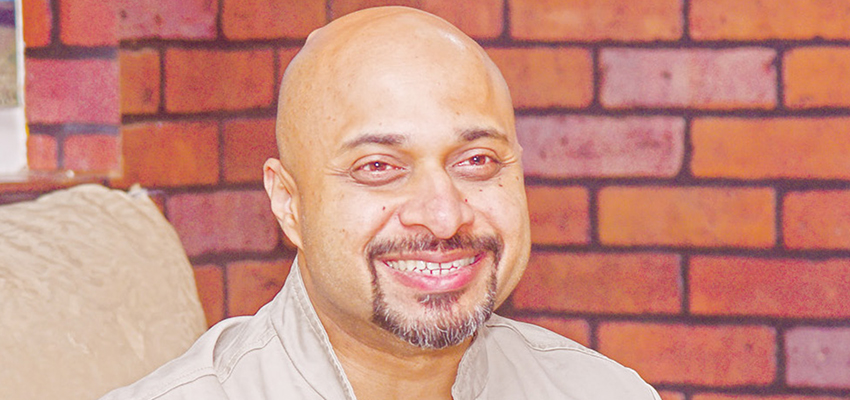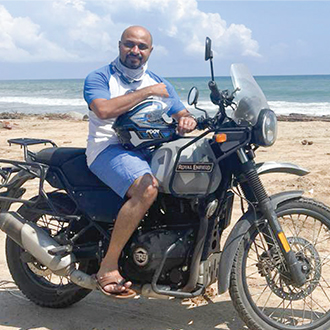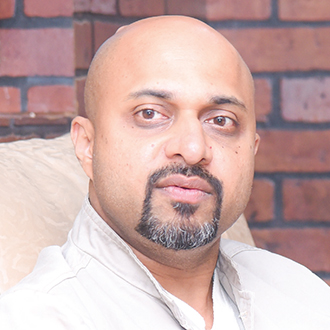Putting People First

Having a vast experience of 18 years in human resources (HR), Antonio Antony, Country Talent Acquisition Lead (India), 3M India Ltd, is a multi-faceted personality. In an exclusive interview with Corporate Citizen, he speaks about his active college life, what attracted him to HR field, experience of working in leading corporate companies and how he devotes his spare time to pursue the hobbies of biking and much more
"I believe that you need to be people inclined to be an HR professional, because we need to understand them better. And, I was naturally very empathetic and I understood people’s problems. So I decided to take up the HR profession, which will allow me to help people."
-Antonio Antony
"Work is a part of life and it will remain an important part of my life. However,it should not determine my identity completely. In realising this, people will be able to strike a balance between work and life "
Corporate Citizen: You were elected as the vice-president of students’ union during your college days. What were your learnings from leading the student’s union?
Antony Antonio: The student union elections taught me a lot. The loss in my first attempt, during my second year degree, primed me for the win during my second attempt in the final year. I stood for the vice-president’s post and won—out of 1,200 students, I got 930 votes which was a strong majority. It required a tremendous effort and a strong belief in what we desire for our college and our students. This desire had to be communicated effectively to every person in campus. Whether it was the most popular students or the academically inclined ones, I remember connecting with each of them at a personal level. Each person likes to be involved, respected and recognised.
LEARNING IS A JOURNEY
CC: What was the reason for you to go for MBA and choose the field of HR?

I always had the inclination for HR, right from the time that I learnt industrial relations and sociology—two subjects that interested me even during my PUC years. During the degree programme it further got strengthened because my triple major was in industrial relations, economics and sociology. In my final year there was also an honour’s programme that I attended on personal growth and inter-personal relations and that’s what really transformed me. I knew for sure that I want to pursue and become an HR professional. I believe that you need to Born and brought up in Bengaluru it is where my early school and college education happened. I started with a school called Presidency school and then moved on to St. Joseph’s Boys High School, moving on to St. Joseph’s Arts and Science College, where I pursued my BA in industrial relations, economics and sociology. Post which I did my MBA at Indian Institute of Planning and Management (IIPM), Delhi, for three years. Followed by working for a while in Delhi, then I came back to Bangalore and pursued my career again.
My dad was into furniture business. My mother is MA in literature and supported my father through his business journey. My mother had aspirations of two things from me. One was, that I study in St. Joseph’s Boys High School and the second was that I pass out of IIM campus. I could not fulfill her second dream early in life, but later, recently while working I did complete a one year executive programme from IIM-Calcutta.
St. Joseph’s College being one of the premier institutes in Bengaluru, did not qualify me for science, while I wasn’t interested in Commerce. I preferred to pursue any course with the St. Joseph’s institutions, because of the values they imbibe and the character they build in young people. I therefore chose Arts at St. Joseph’s Pre-University College (PUC) and pursued history, economics, political science and sociology.
It was lovely two years and it was here that I started developing my interest in Human Resources (HR). be people inclined to be an HR professional because we need to understand them better. And, I was naturally very empathetic and I understood people’s problems. So I decided to take up the HR profession, which will allow me to help people.
CC: Why did you decide to do the IIM Calcutta course and how was your experience doing it?

I am exactly at midway of my career, and taking stock of what I learnt, there was definitely something more I could do. One was to reaffirm my learnings, and two was to learn something new, share thoughts, discuss, etc. It’s another matter totally that its always pleasing to the eye to see an IIM qualification on any CV.
I was blessed with time on hands—having stabilised my career, all this came to help me pursue the programme. So, I invested in the executive programme in strategic HR, from IIM Calcutta. It was an online course—we spent considerable time on it every week. There were assignments that we had to do on weekdays as well.
We had one week of campus immersion as well, where we all had to go and stay in the campus, be residential and experience the whole course there. You have to be attentive during the online classes, ask questions to clear your doubts so that you find it easier to fare well in the examinations.
CC: Tell us about your experience in your first job as a consultant in Planman Consulting.
It was in Delhi and I worked there for approximately one and half years. It was interesting because I believe each city has its characteristics and those characteristics also percolate into the work culture of every place and every organisation. By virtue of that I realised that in Planman Consulting, I enjoyed working there but it required for a person to succeed, to do a lot of power play, to be able to drive yourself you always need to be showing you are the best. But Planman taught me some of my best things that I have learnt in life. I got into recruitment because of Planman. I had actually started with the placement cell, then the placement cell team transferred me to the recruitment business. I was helping there at that time and that’s how I started learning recruitment. So thanks to Planman, today I am a well versed talent acquisition professional.
"Every strong HR professional needs to have the experience of having worked in a factory and understand how to handle industrial relations and employee relations"
CC: How was your stint at Wipro Technologies where you did US recruitment?
Wipro was my first big corporate break and an exciting learning journey for me. We were a team based in Bangalore, working round the clock to support recruitment for Wipro in USA. We recruited many people for our offices in New Jersey, San Jose, Seattle, etc. It was interesting because it’s a whole new game, understanding the geography, the culture, the preferences of candidates, the negotiation points, the nuances in language, etc. Many a times it’s not just US nationals you are hiring; you are hiring Indian nationals who are already in America. Wipro is an organisation that is good for anyone’s career because it is a place with strong values and Azim Premji, founder chairman, is a person of vision. To be able to work with his kind of work ethic is something other worldly. They really teach you how to work and work hard, and that is something I loved about Wipro Technologies.
CC: You have been working with 3M for the last 13 years. What inspired you to stay put with one company for so long?
One of the reasons that I have been with 3M for 13 years is because of the amazing culture and ethics that the organisation. It has been 10 years in a row that 3M has been voted as the world’s most ethical organisation. By virtue of being that, any employee feels proud to work at 3M. Besides feeling pride, the second part is dignity—3M treats every individual with dignity and this goes for any person, independent of the role or post one holds. They treat you with a lot of dignity and fairly— it’s like a nice warm place. I think, the culture comes from the parent company which is based in the US. There is a term that goes with it, they call it the Minnesota Nice, because the company is based in Minnesota. This culture has percolated all the way through company’s culture and you can see it in effect also in the management style here in India.
CC: What are the challenges you face at 3M while recruiting people?
I have held many roles with 3M. I started at 3M, in talent acquisition, as one of the many recruiters there. I quickly proceeded to take a role in corporate communications, which was followed by an intense experience in Plant HR and Industrial Relations, for a good six-plus years. Today, I lead talent acquisition for 3M across India. In this journey there have been some challenging situations. I think the more the challenges the more interesting the job goes. So I think the most challenging or most interesting role was the plant role that I had in the factory. It’s a very different ball game and very different from your corporate exposure and corporate experience. I think that every strong HR professional needs to have that experience of having worked in a factory and understand how to handle industrial relations and employee relations in a factory.
"Experiential learning is always way better than just reading something or listening to something. My best advice to students is to pick up good mentors, pick up good companies that will give you a chance to learn and complement your theory with practical knowledge"
CC: What is your advice to MBA students to excel in studies and career?

What students study during their MBA is theory, a lot of theory. Unless you understand your theory well, you will not be able to do your practicals well. So understand the concepts as well as you can. Seek out examples, interact with corporate folks, see if you can find a mentor, or somebody who can tell you and give you real life examples of the theory that you are studying during your MBA.
If you have free time on hand, check with companies if they can offer you an internship, because being on the ground, seeing what it is, seeing for yourself and experiencing it, you will really learn your best. Experiential learning is always way better than just reading something or listening to something. My best advice to students is to pick up good mentors, pick up good companies that will give you a chance to learn and complement your theory with practical knowledge.
CC: What are the things that you cherish in life?
When it comes to car maintenance, I do it myself. I do a lot of road trips and I am part of multiple biking groups because of my interest in cars, motor bikes and engines. I am interested in everything wheels and motor related. I understand the workings of an engine, understand what could go wrong and how it’s related and where the root cause could be and things like that. It is my area of interest, a hobby that I cherish in life—who knows someday I might start a mechanic shop of my own.
CC: How do you maintain work life balance in your life?
Everybody needs to make time for what they want. If you say you love something, you can’t say you love it unless you give it time. When you say you love biking you need to be able to give it time, make time for it. If you say you love your family, you need to be able to make time for them. When you really love something you will make time for it. I don’t think anybody is too busy to make time for all those things that make them the human being they are, and I think that comes from the fact that I also have a personal belief that work isn’t the only thing in life. Work is a part of life and it will remain an important part of my life. However, it should not determine my identity completely. In realising this, people will be able to strike a balance between work and life.